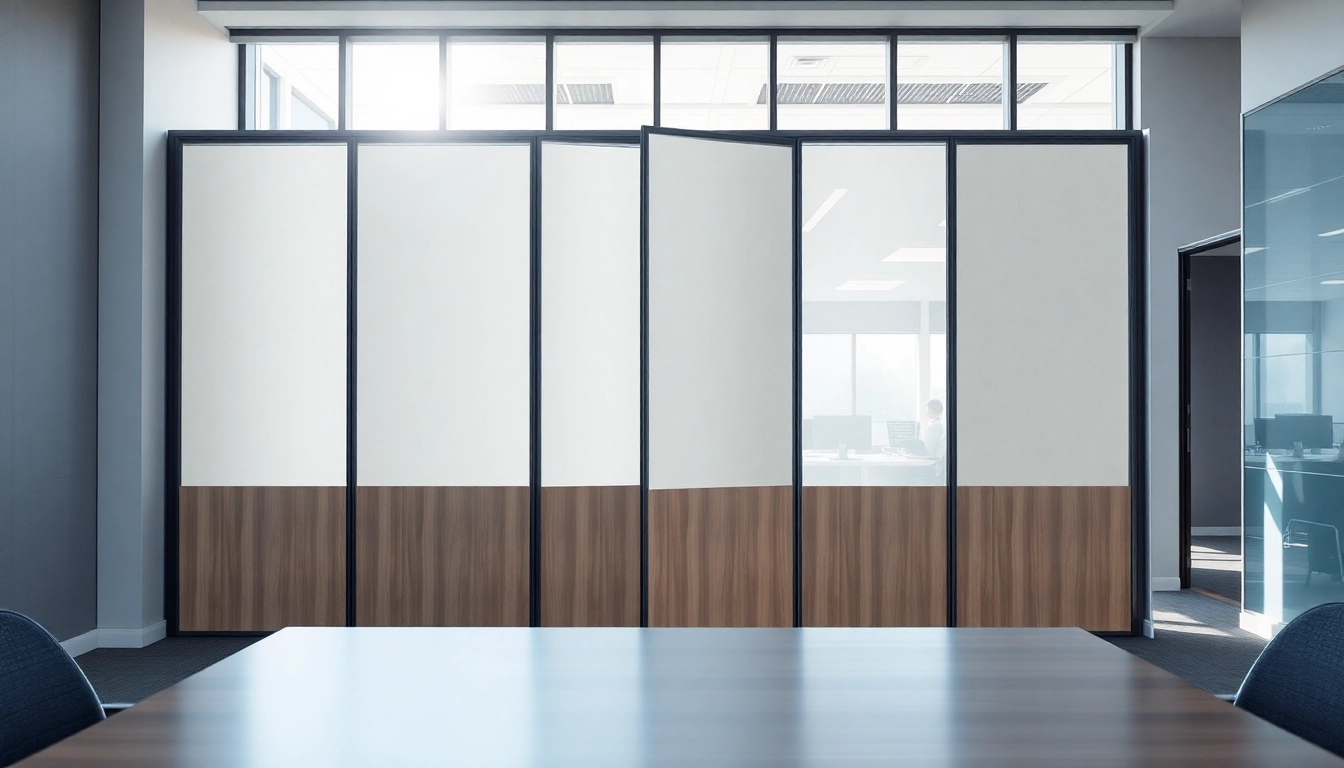Understanding Folding Partition Walls
Folding partition walls, commonly known for their versatility and space-saving benefits, are architectural solutions designed to maximize the utility of available space. Ideal for various environments, including commercial and residential settings, these walls enable users to create adaptive spaces that can meet changing needs. For example, you may want a conference room in the morning and an open office in the afternoon. The functionality of a Folding Partition Wall strongly appeals to architects, designers, and business owners alike.
What is a Folding Partition Wall?
A folding partition wall consists of hinged panels secured together, which can be opened or closed to transform spaces quickly. These walls are typically made from lightweight material, allowing for easy operation while providing sound and visual separation as needed. Depending on the manufacturer, most offer both acoustic qualities and aesthetic flexibility.
Types of Folding Partition Walls
Folding partition walls come in a variety of types that cater to different space requirements and user preferences. Here are some key types:
- Accordion Walls: These walls fold like an accordion and can cover large openings with minimal effort. They are often used in schools and conference centers.
- Operable Walls: These walls can be moved mechanically or manually and can provide exceptional sound insulation, making them ideal for offices and restaurants.
- Glass Folding Walls: Offering transparency, these walls are perfect for restaurants and upscale offices where maintaining light and visibility is essential while still providing a flexible layout.
- Acoustic Folding Walls: Designed specifically for sound control, these walls can create silent rooms even in noisy environments, suitable for theaters and recording studios.
Common Uses and Applications
Folding partition walls are used in numerous settings, showcasing their versatility. Some common applications include:
- Educational Institutions: Classrooms can be divided into separate areas to accommodate group activities and various learning styles.
- Corporate Environments: Open office layouts can be adjusted for meetings, events, or collaborative workspaces.
- Hospitality: Hotels and restaurants frequently use folding walls to create or resize dining areas based on demand.
- Retail Spaces: Seasonal products or promotions can benefit from flexible layout adjustments.
Benefits of Using Folding Partition Walls
Space Optimization and Flexibility
One of the primary advantages of folding partition walls is their ability to optimize space usage. They can easily transform an open area into multiple sections when needed. Businesses often find this beneficial as it allows them to adapt to crowds and events without additional construction costs.
Improved Acoustics and Privacy
Another significant benefit is the potential for improved acoustics. Folding partition walls with sound-dampening materials help maintain a quiet environment. This is especially useful in settings like offices, where distractions can impact productivity, or educational facilities, where focus is essential.
Cost-Effectiveness Compared to Permanent Structures
Compared to permanent walls which require extensive construction and planning, folding partition walls are a cost-effective choice. The initial investment is usually lower, and they can reduce ongoing operational costs by minimizing the need for additional heating or cooling in segmented spaces.
Choosing the Right Folding Partition Wall
Key Features to Consider
When selecting a folding partition wall, several factors should guide your decision:
- Durability: Look for walls made from quality materials that withstand frequent use.
- Sound Insulation: If privacy is crucial, ensure the wall systems provide sufficient soundproofing.
- Ease of Operation: Consider whether the panel operation is manual or motorized and how user-friendly it is.
Material Options and Aesthetic Impact
The materials used for folding partitions range from wood and metal to fabric and glass. Each material offers a distinctive aesthetic and functional quality. For instance, glass walls can impart a modern feel while ensuring transparency in collaborative spaces, whereas wood can provide warmth and a classic look, suitable for offices and homes alike.
How to Select Based on Space Requirements
Consider the specific requirements of your space. For large areas needing frequent division, consider accordion or operable walls. For smaller areas or temporary uses, modular or lightweight solutions could suffice. Be clear about your needs to make an informed decision.
Installation and Maintenance Tips
Professional Installation vs. DIY
While folding partition walls can be installed as DIY projects, professional installation is often recommended. Experts ensure that the walls are secure and function correctly, minimizing potential issues down the road. Additionally, they can guide you in selecting the best options for your specific requirements.
Maintaining Your Folding Partition Wall
Regular maintenance is essential to keep folding partition walls in optimal working condition. Lubricate tracks and hinges periodically, inspect the panels for any signs of wear, and ensure that any seals are intact for sound insulation. A regular check-up can extend the life of your partitions significantly.
Signs That Indicate Need for Repair or Replacement
Watch out for signs that could indicate repairs or replacements are needed, such as difficulty in opening or closing the panels, visible wear on the material, and diminished sound insulation quality. Prompt attention to these issues can avert more significant problems and costs later on.
Case Studies: Successful Implementations
Folding Partitions in Commercial Settings
In various corporate environments, folding partition walls have transformed conventional layouts into multifunctional spaces capable of accommodating different groups simultaneously. For example, a tech company’s headquarters integrated folding walls in its cafeteria, allowing lunch areas to double as event spaces. This flexibility reduced costs in hiring external venues for meetings and gatherings.
Residential Use Cases and Transformations
Homeowners have also begun to recognize the potential of folding partition walls to redefine their living spaces. For instance, a couple transformed their spacious living room with folding panels to create a play area for their children, maintaining openeess during regular use and allowing for flexibility when entertaining guests without irreversible renovations.
Innovative Designs and Trends
As the demand for adaptable spaces continues to grow, innovative designs are emerging. Ceiling-mounted systems allow for seamless operation with acoustic enhancements, while new materials such as smart glass that can transition from clear to opaque on demand are making significant inroads in the market. These advancements not only enhance aesthetic appeal but also significantly improve functionality and acoustics.



